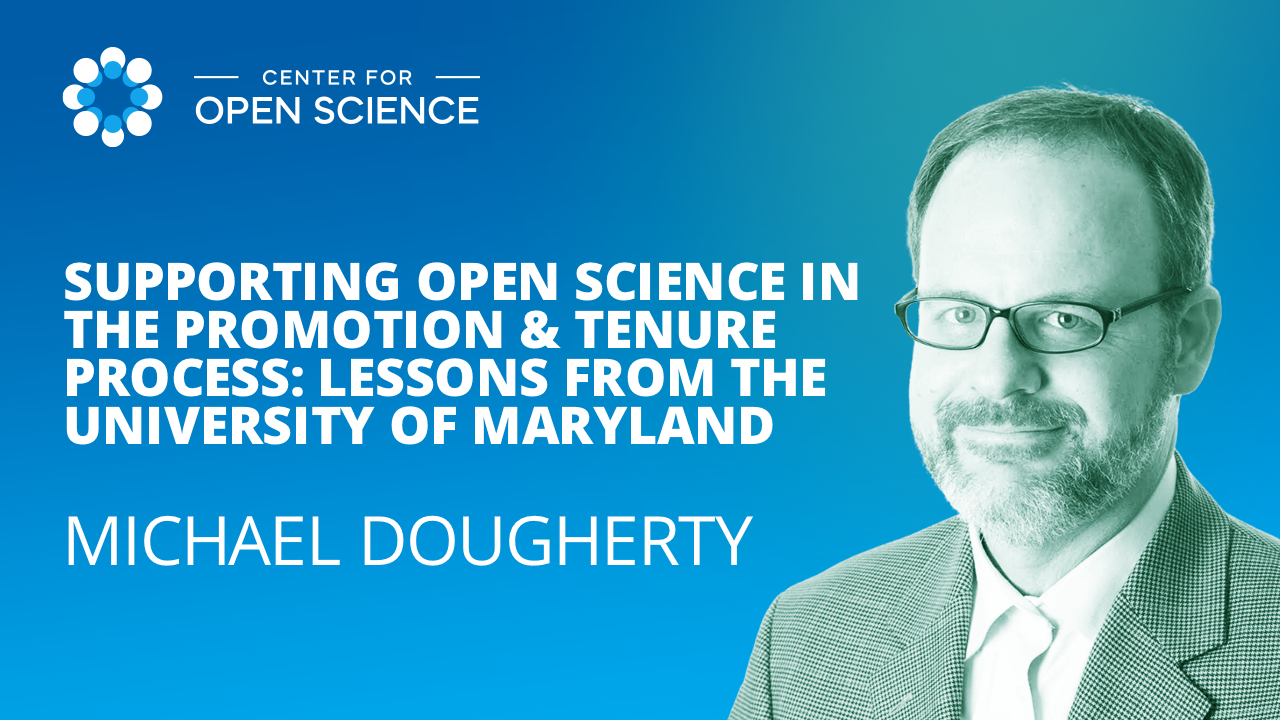
The academic promotion and tenure process establishes the incentive structure for institutions of higher education. Open science champions have long advocated for the process to better reflect important open science scholarship that is often under-valued and neglected in academia.
COS hosted a webinar on September 27, 2022, highlighting the five-year effort in the Psychology Department at the University of Maryland to adopt new guidelines that explicitly codify open science as a core criteria in tenure and promotion review. According to Dr. Michael Doughetry, Department Chair, the new policy was necessary to ensure incentives for advancement reflect the values of scientists and their institutions.
Speaker:
“Some of the things we’ve done here at the University of Maryland may be lessons learned for the rest of the community that is interested in really promoting and moving beyond advocating for open science and really doing the hard work to make this happen at your institution,” Dr. Doughtry said.
When evaluating the previous tenure and promotion policy at the University of Maryland, Dr. Doughtry identified gaps that prompted him to reevaluate and develop new guidelines. His goal was to develop policies that codify what it means to be fair to science and fair to the scientific community, funders, and the taxpayers that make this work possible.
Prior to the development of the new promotion and tenure guidelines, Dr. Doughtry noted that the policy reflected historical views of what it means to evaluate research. “When we talk about evaluating research, the question oftentimes is are we evaluating the reputation of someone or are we evaluating the substance of one’s work,” Dr. Dougtry said.
Dr. Droughty’s aim was to develop new guidelines that focus on issues surrounding responsible conduct of research and reproducibility, rather than solely on reputation.
“We do our work for the betterment of society,” Dr. Doughtry said. “It’s difficult to see how our work benefits anybody other than ourselves if it’s not made maximally accessible.”
Dr. Doughty noted that if research is behind a paywall or data is not accessible, it limits the scientific impact. One goal of incorporating open science practices into tenure and promotion policies is to make a broader impact and have research efforts more accessible to the public.
In addition to making sure faculty is evaluated on the substance of their work and not just reputational criteria, the newly developed guidelines were designed to give faculty to power to think about the most appropriate place to publish their work and give them the power to do science the way they want to do science, allowing them to maximize the integrity of their work.
Dr. Doughtry provided six tips for individuals looking to implement open science in the tenure and promotion process:
Anyone looking for guidance on developing new guidelines or advocating for open science behavior can connect with Dr. Doughtry by filling out this Google Form.

6218 Georgia Avenue NW, Suite #1, Unit 3189
Washington, DC 20011
Email: contact@cos.io

Unless otherwise noted, this site is licensed under a Creative Commons Attribution 4.0 International (CC BY 4.0) License.
Responsible stewards of your support
COS has earned top recognition from Charity Navigator and Candid (formerly GuideStar) for our financial transparency and accountability to our mission. COS and the OSF were also awarded SOC2 accreditation in 2023 after an independent assessment of our security and procedures by the American Institute of CPAs (AICPA).
We invite all of our sponsors, partners, and members of the community to learn more about how our organization operates, our impact, our financial performance, and our nonprofit status.